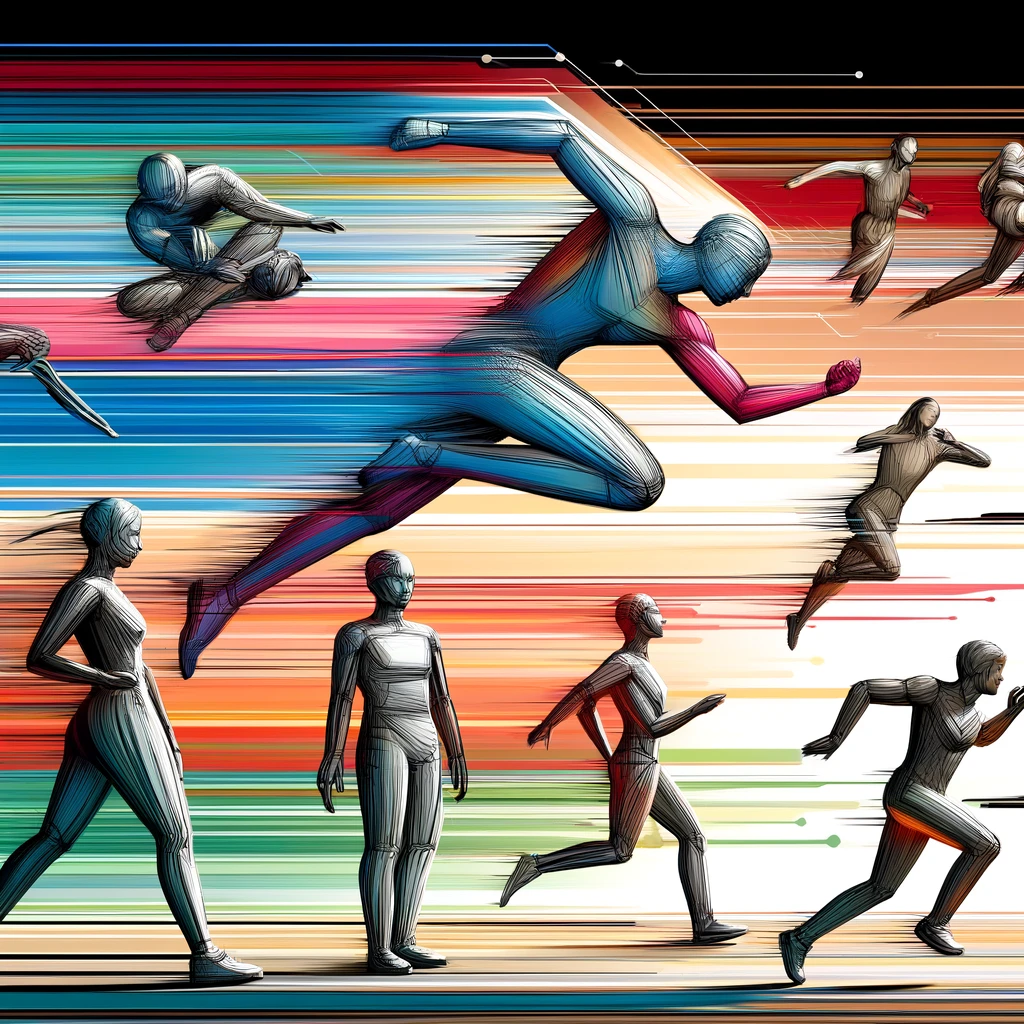Motion
Definition
A motion is the action or process of moving or being moved.
Parts of Speech
- Noun
- Verb
Pronunciation
American English
- IPA Pronunciation: /ˈmoʊʃən/
- Respelling: MOH-shun (with "MOH" as in "motel" and "shun" as in "mission")
British English
- IPA Pronunciation: /ˈməʊʃən/
- Respelling: MOH-shun (with "MOH" as in "motel" and "shun" as in "mission")
In both dialects, "motion" places the primary stress on the first syllable, "MOH." The pronunciation remains consistent across both American and British English, focusing on the clear articulation of "MOH-shun."
Etymology
The term "motion" originates from the Latin word "mōtiō", from "mōtus", the past participle of "mōvēre" meaning "to move". It entered English around the late Middle English period.
Derivatives
- Motionless
- Motioner
- Motioning
- Remotion
- Emotion
Synonyms
- Movement
- Action
- Gesture
Antonyms
- Stillness
- Stasis
- Inactivity
Usage
"Motion" can refer to the action or process of moving physically, or a formal proposal put to a legislative body.
- The dancer's motion was fluid and graceful.
- The council will discuss the motion to build a new playground.
- With a swift motion, she brushed her hair back.
Related Terms
- Locomotion
- Emotion
- Promotion
- Commotion
- Notion
Detailed Definition
Noun
- Physical Movement: An act, process, or instance of changing place.
- Example: The perpetual motion of the planets.
- Formal Proposal: A formal proposal put to a legislative or committee body.
- Example: The council member raised a motion to increase funds for healthcare.
- Gesture: A gesture or sign used to express or indicate something.
- Example: With a simple motion of her hand, she signaled for silence.
Verb
- Direct or Command: To direct or command (someone) by a movement or gesture.
- Example: She motioned for everyone to sit.
- Move or Propel: To move or propel in a specified direction or manner.
- Example: The machine motioned the conveyor belt forward.
motion



🇨🇳 Mandarin
- 运动 (Movement)
- IPA: [yùn dòng]
- Respell: yùn dòng
- 动作 (Action, Motion)
- IPA: [dòng zuò]
- Respell: dòng zuò
🇮🇳 Hindi
- गति (Movement)
- IPA: [ɡəti]
- Respell: gati
- प्रस्ताव (Proposal, Motion)
- IPA: [prəst̪aːʋ]
- Respell: prastāv
🇪🇸 Spanish
- Movimiento (Movement)
- IPA: [moβiˈmjento]
- Respell: movimiento
- Moción (Motion, Proposal)
- IPA: [moˈθjon]
- Respell: moción
🇫🇷 French
- Mouvement (Movement)
- IPA: [muvmɑ̃]
- Respell: mouvement
- Motion (Motion, Proposal)
- IPA: [mɔsjɔ̃]
- Respell: motion
🇸🇦 Modern Standard Arabic
- حركة (Movement)
- IPA: [ħaraka]
- Respell: ḥaraka
- اقتراح (Proposal, Motion)
- IPA: [iqtiˈraːħ]
- Respell: iqtirāḥ
🇧🇩 Bengali
- গতি (Movement)
- IPA: [ɡoti]
- Respell: goti
- প্রস্তাব (Proposal, Motion)
- IPA: [prostav]
- Respell: prostāb
🇷🇺 Russian
- Движение (Movement)
- IPA: [ˈdvʲiʐɨnʲɪje]
- Respell: dvizhenie
- Предложение (Proposal, Motion)
- IPA: [prʲɪdlɐˈʐenʲɪje]
- Respell: predlozhenie
🇵🇹 Portuguese
- Movimento (Movement)
- IPA: [moviˈmẽtu]
- Respell: movimento
- Moção (Motion, Proposal)
- IPA: [moˈsɐ̃w]
- Respell: moção
🇮🇩 Indonesian
- Gerakan (Movement)
- IPA: [ɡəˈrakan]
- Respell: gerakan
- Usulan (Proposal, Motion)
- IPA: [usulˈan]
- Respell: usulan
🇩🇪 German
- Bewegung (Movement)
- IPA: [bəˈveːɡʊŋ]
- Respell: Bewegung
- Antrag (Proposal, Motion)
- IPA: [ˈanˌtʁaːk]
- Respell: Antrag
🇯🇵 Japanese
- 運動 (Movement)
- IPA: [undō]
- Respell: undō
- 動議 (Proposal, Motion)
- IPA: [dōgi]
- Respell: dōgi
🇻🇳 Vietnamese
- Chuyển động (Movement)
- IPA: [cwiən˧˧ ɗəwŋ˧˧]
- Respell: chuyển động
- Đề xuất (Proposal, Motion)
- IPA: [ɗê suət]
- Respell: đề xuất
🇰🇷 Korean
- 운동 (Movement)
- IPA: [undong]
- Respell: undong
- 안건 (Proposal, Motion)
- IPA: [anɡeon]
- Respell: angeon
🇹🇷 Turkish
- Hareket (Movement)
- IPA: [haɾeˈket]
- Respell: hareket
- Teklif (Proposal, Motion)
- IPA: [teˈklif]
- Respell: teklif
🇵🇰 Urdu
- حرکت (Movement)
- IPA: [hərˈkat]
- Respell: harkat
- تجویز (Proposal, Motion)
- IPA: [t̪ədʒˈviːz]
- Respell: tajweez





